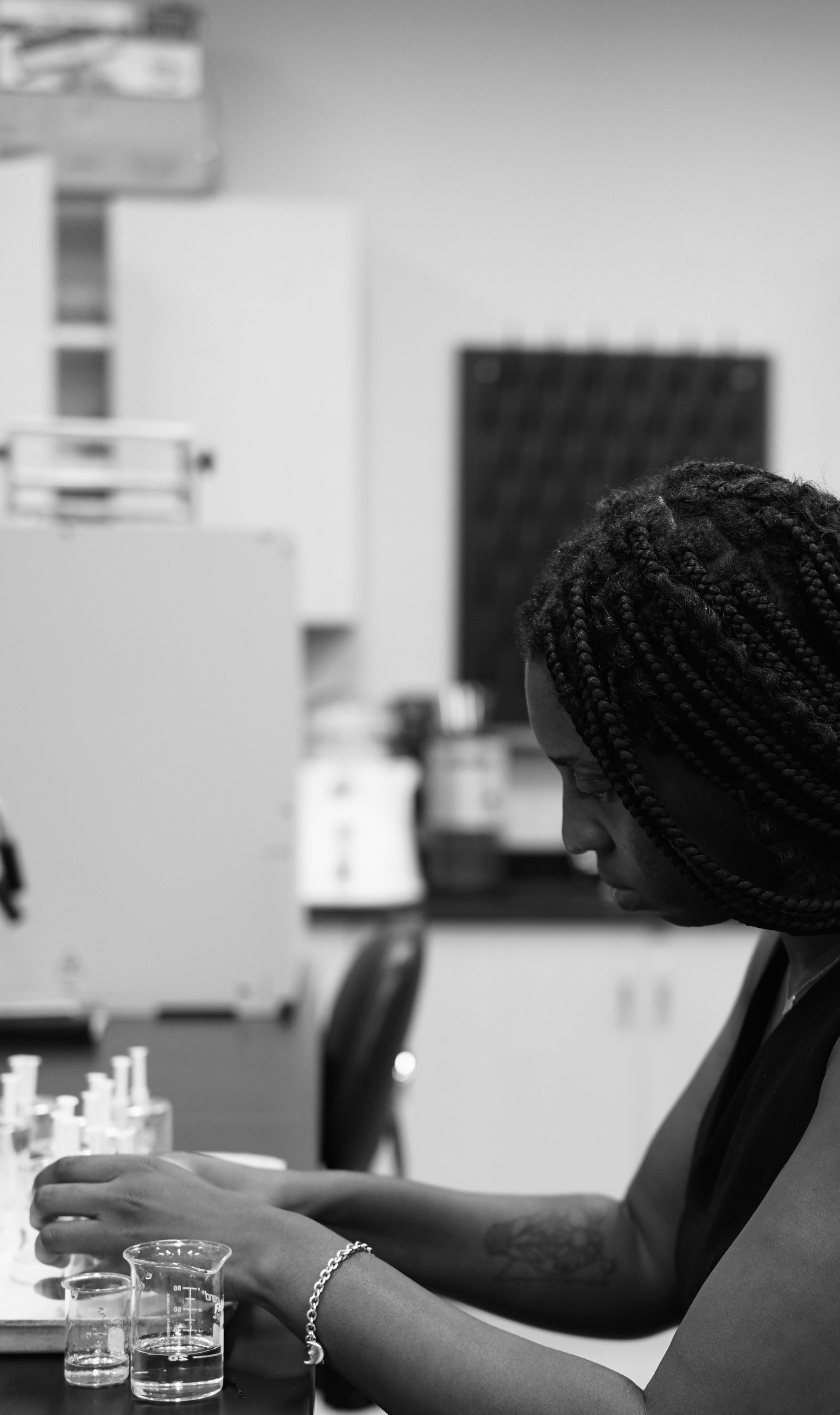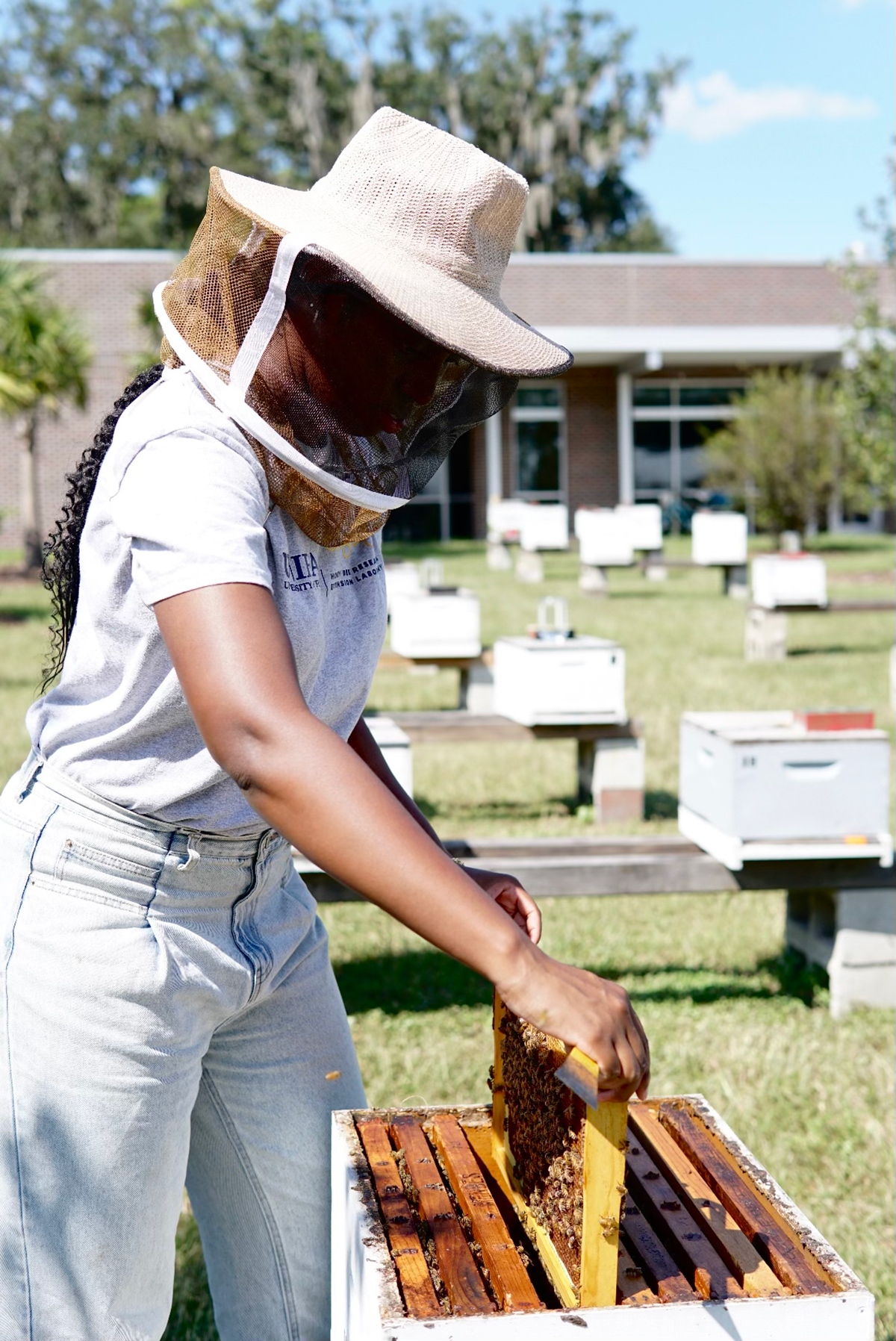Celebrating Pollinator Week with Vernaeyah Lane, Dedicated Pollinator Scientist by Makeda Nurradin, U.S. Fish & Wildlife Service
June 19, 2024
Pollinator Week is a time to raise awareness about the key role pollinators play in our ecosystems, and we at the U.S. Fish and Wildlife Service are shining a spotlight on those who play a role in pollinator conservation. Vernaeyah Lane is a passionate pollinator scientist whose work and insights offer a valuable perspective on the importance of these essential creatures. She earned her master of science in agriculture education from Auburn University, focusing on outreach and education. Her primary research examines the impact of pesticides and pollutants on pollinators. Her responses provide a roadmap for those interested in supporting pollinator health and explore the connections between pollinator conservation and broader social issues.
A Journey into Pollinator Toxicology
Vernaeyah Lane embarked on a journey into pollinator toxicology, exploring the effects of harmful substances on various pollinators. Her work is both captivating and demanding, focusing on the impacts of certain pesticides, pollutants, and other chemicals on pollinator populations and their overall health.
In the bee lab, Devan Rawn

"One of my initial projects involves rearing worker bees (apis mellifera) in vitro to study how different chemicals affect their physiology, behavior, and reproduction. This research aims to pinpoint specific mechanisms of toxicity and predict the consequences of chemical exposure on pollinator colonies in real-world scenarios," Lane explained. "Additionally, I am screening novel compounds against honey bee pests, such as the small hive beetle, Aethina tumida and varroa destructor ensuring their safety to pollinators as part of a vital research priority."
Early Interest in Pollinators
During her college years, Lane was on the lookout for a club or organization that resonated with her personality and interests. "The beekeeping club caught my attention, so I decided to attend one of their field meetings, which involved inspecting a beehive up close. I vividly recall that day because I was absolutely petrified; I stood about 10 feet away from the hive, watching cautiously while everyone else seemed at ease," she recounted.
"Despite my initial fear, there was something captivating about the bees and their intricate hive dynamics that drew me in. Surprisingly, I found myself returning to subsequent meetings, gradually overcoming my apprehension, and becoming increasingly fascinated. It was a transformative experience that sparked my enduring interest in pollinators."
Examines hive frame, Devan Rawn

In addition to being a member of the Tuskegee Bee Club, Lane did work-study as a field
assistant, gaining a solid foundation in bee biology and behavior, hive management,
queen rearing, swarming, and pest and disease management. She is incredibly grateful
for the invaluable guidance and support her mentors, Dr. Harold Higgins and Dr.
Franklin Quarcoo, professors at Tuskegee University, provided on her journey in the
world of apiculture. "Their wisdom, dedication, and unwavering belief in my potential
were a driving force behind my achievements and interest in bee science," she said.
Advice for Aspiring Pollinator Advocates
In addition to being a member of the Tuskegee Bee Club, Lane did work-study as a field assistant, gaining a solid foundation in bee biology and behavior, hive management, queen rearing, swarming, and pest and disease management. She is incredibly grateful for the invaluable guidance and support her mentors, Dr. Harold Higgins and Dr. Franklin Quarcoo, professors at Tuskegee University, provided on her journey in the world of apiculture. "Their wisdom, dedication, and unwavering belief in my potential were a driving force behind my achievements and interest in bee science," she said.
Advice for Aspiring Pollinator Advocates
When asked for advice for high schoolers and the community interested in working with pollinators, Lane offered a multifaceted approach:
• Focus on STEM education: She recommends focusing on STEM (science, technology, engineering, and mathematics) courses during the academic journey. This foundation is fundamental for understanding the scientific principles behind pollinator health and conservation.
• Volunteer with local organizations: "Volunteering with local beekeeping associations, community gardens, or other environmental organizations offers hands-on exposure to pollinator conservation efforts. These experiences provide valuable networking opportunities and practical skills development."
• Seek mentorship: Finding a mentor in the field, whether a researcher, beekeeper, or conservationist, can provide guidance, support, and invaluable insights as one navigates their path in the world of pollinators.
• Embrace self-directed learning: "Exploring books, online resources, and educational programs focused on pollinator studies can deepen understanding and keep individuals updated on the latest research and conservation practices."
By combining academic pursuits, hands-on experiences, mentorship, and self-directed learning, aspiring pollinator advocates can pave the way for a fulfilling and impactful career in the realm of pollinators and environmental conservation.
Juneteenth and Pollinator Week: A Meaningful Intersection
With Juneteenth and Pollinator Week being around the same time, Lane sees significant connections. "Juneteenth represents freedom, justice, and the ongoing struggle for equality. It's a day to reflect on the past and work towards a more just future for all."
Meet the pollinator scientist: Vernaeyah standing proudly near pollinator lab, Ayla Babanikos

Beekeeping has historical ties to social empowerment, particularly within the African American community. Leaders such as Booker T. Washington and Dr. George Washington Carver, integral to Tuskegee University's ethos, blended practical agriculture with social empowerment. Washington's vision ensured that students acquired beekeeping skills, a tradition continued by Carver, who aimed to transform cotton farmers into beekeepers.
Lane emphasized the significant role beekeeping played in providing Black women with a space for independence and active involvement in their communities. Mrs. Margaret Murray Washington’s initiative in founding The Beekeeping Ladies, a group entirely led by women, highlighted the multifaced role of beekeeping. It wasn’t merely a practical skill but also symbolized the strength of Black identity, the resilience of the community, and a commitment to environmental care within the Tuskegee community.
Lane expressed deep passion for her advancements in insect toxicology, focusing on positively influencing pollinator ecosystems. Her time at the University of Florida Bee Research and Extension Lab has been invaluable, providing ample networking opportunities and fostering significant professional growth as she transitions from academia to industry. "Recently, I've accepted an associate scientist position where I'll concentrate on various pollinators," she shared.
This conversation with Vernaeyah Lane highlights the intricate connections between pollinator conservation and broader social issues, emphasizing the importance of education, mentorship, and community involvement. As we celebrate Pollinator Week, her insights remind us of the significant role pollinators play in our ecosystems and the collective efforts needed to protect them.
Exciting Future Projects
Lane expressed deep passion for her advancements in insect toxicology, focusing on positively influencing pollinator ecosystems. Her time at the University of Florida Honey bee Research and Extension Laboratory has been invaluable, providing ample networking opportunities and fostering significant professional growth as she transitions from academia to industry. "Recently, I've accepted an associate scientist position where I'll concentrate on honey bees, bumble bees and various other pollinators," she shared.
This conversation with Vernaeyah Lane highlights the intricate connections between pollinator conservation and broader social issues, emphasizing the importance of education, mentorship, and community involvement. As we celebrate Pollinator Week, her insights remind us of the significant role pollinators play in our ecosystems and the collective efforts needed to protect them.